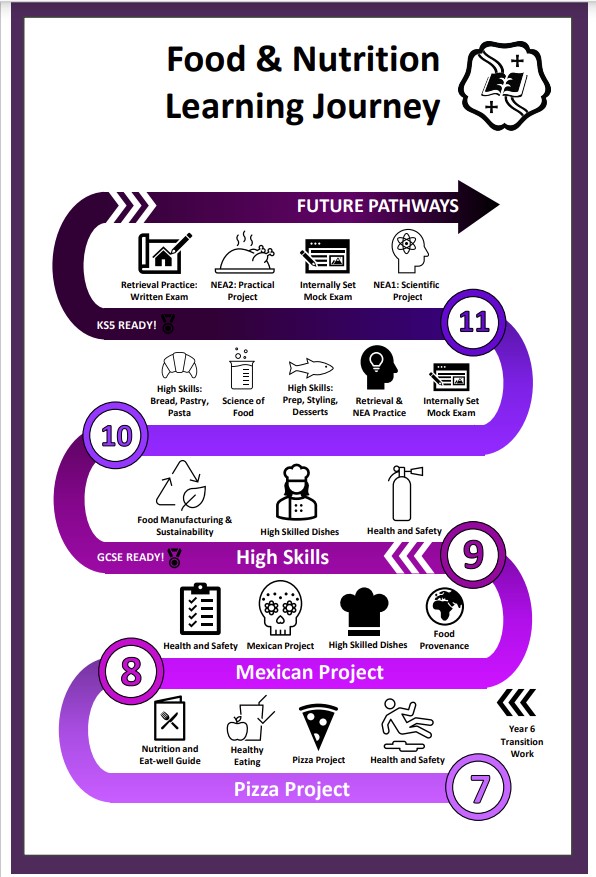To learn a range of dishes using a large range of practical skills. Also learning healthy eating and evaluation techniques

The WJEC Eduqas GCSE in Food Preparation and Nutrition equips learners with the knowledge, understanding and skills required to cook and apply the principles of food science, nutrition and healthy eating. It encourages learners to cook, enables them to make informed decisions about food and nutrition and allows them to acquire knowledge in order to be able to feed themselves and others affordably and nutritiously, now and later in life.
Exam Board: WJEC/EDUQAS
Qualification Title: Food Preparation & Nutrition
Qualification Specification Code:
Qualification Webpage: Click here to visit the WJEC/EDUQAS webpage for the specification.
By studying food preparation and nutrition learners will:
•be able to demonstrate effective and safe cooking skills by planning, preparing
and cooking a variety of food commodities whilst using different cooking
techniques and equipment
•develop knowledge and understanding of the functional properties and chemical
characteristics of food as well as a sound knowledge of the nutritional content of
food and drinks
•understand the relationship between diet, nutrition and health, including the
physiological and psychological effects of poor diet and health
•understand the economic, environmental, ethical and socio-cultural influences on
food availability, production processes, diet and health choices
•demonstrate knowledge and understanding of functional and nutritional
properties, sensory qualities and microbiological food safety considerations when
preparing, processing, storing, cooking and serving food
•understand and explore a range of ingredients and processes from different
culinary traditions (traditional British and international) to inspire new ideas or
modify existing recipes.
There are no previous learning requirements for this specification. Any requirements set for entry to a course based on this specification are at the school/college’s discretion.

Assessment 1: The Food Investigation Assessment
15% of total qualification
A Food Investigation will be set that will require each learner to:
(i) (a) research and plan the task
(b) investigate the working characteristics, function and chemical properties of
ingredients through practical experimentation and use the findings to
achieve a particular result
(c) analyse and evaluate the task
(ii) produce a report which evidences all of the above.
Assessment 2:The Food Preparation Assessment
35% of total qualification
This assessment is synoptic and assesses the application of knowledge and understanding in relation to selecting dishes and identifying cooking skills/techniques and the execution of practical skills. This assessment will require learners to:
Plan, prepare, cook and present a selection of selection of dishes, to meet particular requirements such as a dietary need, lifestyle choice or specific context.
Two options for this assessment will be set by WJEC Eduqas that will require the learners to:
(a) investigate and plan the task, select a final menu to be produced to showcase
skills and produce a plan of action for the practical execution of the dishes (to
include trialling and testing)
(b) prepare, cook and present a menu of three dishes within a single session.
(c) evaluate the selection, preparation, cooking and presentation of the three
dishes
(ii) produce a folio of evidence which includes documentation related to the selection of
dishes, planning and evaluation and photographs and/or visual recordings which
demonstrate the learner’s application of technical skills and the final outcomes.
This specification builds on subject content which is typically taught at Key Stage 3
and provides a suitable foundation for the study of WJEC Level 3 Food, Science and
Nutrition, and other food-related courses at either AS or A level. In addition, this
specification provides a coherent, satisfying and worthwhile course of study for
learners who do not progress to further study in this subject.
This specification will enable learners to make informed decisions about a wide range
of further learning opportunities and career pathways.
Mr Hewitt
Owned by: MDS | Last Published: 20/09/2019 09:53:36 | Next Update: N/A